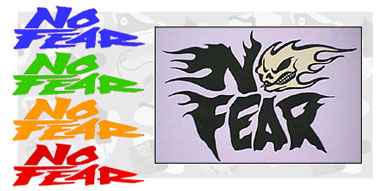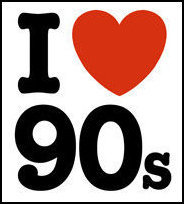
I deliberated for a sizable chunk of time about what constituted an appropriate topic for Martin Luther King Jr. Day. Sure, these heart-palpitating deliberations were conducted while watching the Golden Globes, but it was a grueling process nonetheless. Thanks to plenty of breaks for rest, Powerade, and protein bars, I was able to make it through. I appreciate your concern, though.
As you know, we love to have a good time here at Children of the 90s, but there are certain topics that probably transcend sarcasm in good taste. That brings us back to the original question: what's the proper etiquette here? As a pop culture blog that covers such groundbreaking issues as Mall Madness and Where's Waldo? books, it can be tough to make that leap to any sort of politically-minded commentary. The Children of the 90s sense of satire tends to lean more toward retired snack food than underlying divisive societal issues. Then again, based on some of the debates we've had going here in the comment section about the merits or shortcomings of Ring Pops, some topics may be more divisive than I'd initially imagined.
So while I could have pulled a moderately-proportioned cop-out move on you and just posted Michael Jackson's "Black or White" video (which I like, for the record), I decided to pull an even bigger one and post a whole bunch of 90s popular songs that reside in a similar genre. Like I said, we've had a lot of laughs here, but that doesn't mean we can't try our hand at tackling some of the big issues occasionally. Some might argue that listening to a couple of popular songs about racial inequality may not add up to "tackling" but to those critics I say, hey. Cut me a little slack here. We're still allowed to have a little fun. There's no rule that dabbling in the issues has to come at the expense of lighthearted fun. Well, actually, there might be, but we're just going to disregard that for the time being.
Black or White (Michael Jackson)
Watch Michael Jackson - Black Or White in Music | View More Free Videos Online at Veoh.com
Let me say right off the bat that I'm a huge Michael Jackson fan. Say what you will about the late performer's personal life, but he made more than his share of contributions to the world of pop music. Before its release, "Black or White" was described by Jackson's label as a "rock n' roll song about racial harmony," and the song delivered on that promise. Admittedly, this video isn't for everyone; it's undeniably a bit hokey, but it's over-the-top in a way consistent with Michael Jackson's style. Macaulay Culkin plays a kid who wants to blast his music, much to the chagrin of his grumpy dad played by George Wendt. George is transported to Africa, where we witness a cross-cultural celebration of dance.
The video is best known for the morphing sequence that takes place toward the end of the video, with faces gradually transitioning from one person to another. As a kid, I was pretty sure this was the coolest thing I'd ever seen, though I did have a brief fear that one day I'd look in the mirror to see my face transition through a rainbow of races.
The song isn't revolutionary in its lyrics; it's pretty general and straightforward, but it certainly makes its point. The rap part in the middle is the meatiest, lamenting "turf war on a global scale" and proclaiming "I'm not going to spend my life being a color." "Black or White" must have spoken to the general public, as the song quickly shot to number 1 on the Billboard charts.
Changes (2Pac)
Released posthumously, "Changes" was a compilation of a number of Tupac's raps. "Changes" samples Bruce Hornsby and the Range's 1986 song "The Way It Is" and expounds on many of its themes, albeit with more profanity. The song is starkly honest about many of the issues facing blacks in America, touching on many of the inherent racial inequalities in American society. The lyrics sugarcoat nothing, and give a pretty bleak outlook on the prospects of racial equality. There are some upbeat elements, though, namely the eponymous "changes" Tupac suggests we make to our lives.
On a more upbeat note of progress, it seems time has defied some of the charges in the song. "Changes" declares "We're not ready to see a black president," which suggests that maybe we've made some headway since "Changes" hit the airwaves in 1998. In late 2009, the song was in the spotlight again for its curious placement on the Vatican's official MySpace playlist. Apparently they deem "Changes" to be on par with Mozart, which is a promising sign for acceptance.
F tha Police (NWA)
Don't be fooled by the tongue-in-cheekiness of the song's title; this one really gets to the heart of the issue. The song had its share of big names in the rising rap scene, produced by Dr. Dre and featuring Ice Cube. "F*** tha Police" sets the scene in a courtroom with rappers offering inflammatory testimonials to the unequal and sometimes brutal treatment of blacks by police officers. It's incredibly volatile, even suggesting violent retaliation against the police, but it also brings to light some issues of racial profiling in law enforcement. While the song predates the Rodney King beating and subsequent LA race riots by a few years, it certainly exemplifies the high levels of tension between police and minorities.
Free Your Mind (En Vogue)
"Free Your Mind" debuted amid the race riots stemming from the Rodney King brutality incident. As the issue of racial inequities in America were coming to a head, the female R&B group released this song to highlight some of the prejudice and systemic issues. The song's lyrics aren't quite as gritty of some of the other songs on this list, but they still touched on
While this post might be a bit too flimsy to pay deserved tribute to Dr. King and the civil rights movement, the songs all highlight issues that continue to plague us. While we've arguably made some progress, there is--as the cliche so aptly tells--a lot of work to be done, not only regarding racial inequality but also all of the other inequities in our society. Until we can reach that point, though, we might just have to settle for uniting in our common love of nostalgia. If we can all enjoy reminiscing about the 90s, can't we all just get along? It seems like a logical leap.
Speaking of socially relevant issues, now seems as good a time as ever to mention the recent Haitian earthquake. Like Cher says in Clueless:
"So like, right now for example. The Haitians need to come to America. But some people are all, "What about the strain on our resources?" Well it's like when I had this garden party for my father's birthday, right? I put R.S.V.P. 'cause it was a sit-down dinner. But some people came that like did not R.S.V.P. I was like totally buggin'. I had to haul ass to the kitchen, redistribute the food, and squish in extra place settings. But by the end of the day it was, like, the more the merrier. And so if the government could just get to the kitchen, rearrange some things, we could certainly party with the Haitians. And in conclusion may I please remind you it does not say R.S.V.P. on the Statue of Liberty."
We can't always just leave it to the government, so if we could all take a little time to get to our figurative financial kitchens and rearrange some things we could certainly help out the Haitians. I know I possibly just stretched that connection a bit too far, but please consider donating to any legitimate charitable organization. If you need it, this site offers a lot in the way of helpful advice on where to direct your monetary donations.
As long as we're going to take some time to examine some problems here at home, we can definitely spare some to address those facing the international community. If you don't believe me that there's an international community, just watch that above Michael Jackson video one more time. If we can't collaborate on some sort of full-scale international dance number, the least we can do is try our best to reach out to others.







